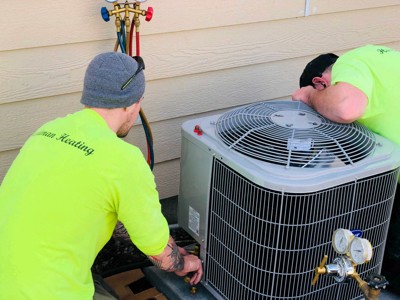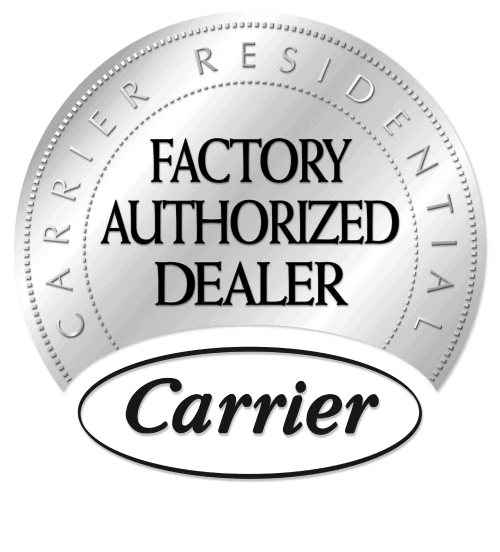A clogged air filter is a common reason for your air conditioner not blowing cold air on a hot summer day and should normally be the first thing to look at when troubleshooting.
Air filters are an important component of any air conditioning system. However, when the air filter becomes clogged with dirt and debris, it stops enough air from moving through the system to keep it running properly, causing the air conditioner to lose its cooling power.
We recommend changing your air filter every 1-3 months to avoid the inefficient performance of your air conditioning unit or its total shutdown.
But what if, after changing your air filter, the HVAC is still not blowing cold air?
A dirty air filter is not the only cause of the HVAC not blowing cold air. After replacing the filter, you should wait at least 12 hours before running the system. If the AC is still not blowing cold air, it could signify that you have a refrigerant leak, a damaged condenser, or your entire mechanical system needs maintenance.
However, other reasons your HVAC unit is not blowing cold air may be something you can easily fix yourself. You may want to troubleshoot the problems before contacting a professional repair service.
Troubleshoot Your HVAC System For the Following Problems
-
Wrong Air filter Size
If you replace your air filter with the incorrect size, your unit may become overworked, resulting in your HVAC not blowing cold air.
Check to ensure that the air filter in your return vent is the correct size and model. If your previous filter does not have size labels, you can measure it using a tape measure or a ruler.
-
Power Issue
Air conditioners consume a great amount of power. If your AC system does not receive enough electricity, it will not function properly.
The power issue could also be that you have a damaged fuse or circuit breaker. The ac unit will not blow cold air if the breaker for the inside or outside unit trips.
Get your circuit breaker checked and repaired if necessary to fix this issue. Also, make sure your system is properly plugged into the socket and that the power cord is still attached.
-
Wrong Thermostat Setting
While you may set your thermostat to a specific temperature, someone could have changed the setting without your knowledge. Check your thermostat to ensure it’s set to an appropriate temperature. The Department of Energy suggests 68 degrees F as the ideal temperature to keep your home cool while saving energy.
Some central air conditioner units require the thermostat to be set to “Auto” mode to function properly. When set to “Auto,” the thermostat turns on the air conditioning when the indoor temperature climbs above the preset temperature.
However, if the switch is accidentally set to “On” or “Fan,” as the case may be, the system will only blow air but not cool.
Finally, confirm that all wiring connections into the thermostat unit are made correctly.
-
Dirty Condenser
Your condenser is in charge of producing the cold air that your indoor fan distributes around your home. When grass, mud, and other debris become stuck in the condenser, it interferes with the efficient cooling of your air conditioning system.
Include cleaning the condenser and its surroundings in your routine maintenance.
Cleaning your condenser is simple. Switch the unit off when cleaning to avoid destroying any of your system’s panels. Also, be careful when cleaning to avoid bending or breaking anything.
-
Clogged Drain
Air conditioners function by extracting moisture from the air and cooling it to the desired temperature. The water is evacuated from your property via the condensation drain.
Over time, mold and algae growth can clog the condensate drain hose. The AC units cease to remove moisture from the air, causing it not to blow cold air.
As part of routine maintenance, gently remove the molds in the drainpipe with a screwdriver and rinse the drain line with cleaning agents such as distilled vinegar.
If you can’t find the drain lines, hire an HVAC specialist to show you where they are and assist you with the cleaning.
When You Need to Contact a Professional
The issues described above are those you can address on your own, but others require you to consult an HVAC specialist for a solution.
-
Refrigerant Leak
The refrigerant is a vital fluid that absorbs heat from the surrounding air; if there is a leak in your system, your air conditioner may stop blowing cold air.
This problem is easily identified by indications such as hissing or whistling air conditioner noises or an icy buildup on the outside unit. Once identified, contact an HVAC specialist to get this issue resolved.
-
Damaged Condenser
If you have a malfunctioning or broken condenser fan motor, the condenser will be unable to remove heat, interfering with an air conditioning unit’s ability to cool.
You should replace a damaged condenser fan motor immediately when you notice the problem. Contact an air conditioner repair professional to help you with this.
-
Smaller System Size
You will almost surely have cooling issues if your air conditioning unit is too small for the size of your home or office.
A larger unit is required for a large home. When your air conditioner is too small, it runs continuously and never reaches the temperature you set for it. Your home never feels cold enough.
If this is the situation with your air conditioner, you may need to replace it with one of a decent size. Contact an HVAC professional to assess your home and recommend the best air conditioner unit.
Preventive Maintenance With Hurliman Heating and Air Conditioning
Preventative maintenance is the most effective way to keep your air conditioning unit in top working order. To avoid sweltering in the hot summer, get your unit serviced and maintained at least every three months. If you live in Spokane, WA, or surrounding areas, Contact Hurliman and our HVAC specialists today to schedule an inspection and service your HVAC system.





